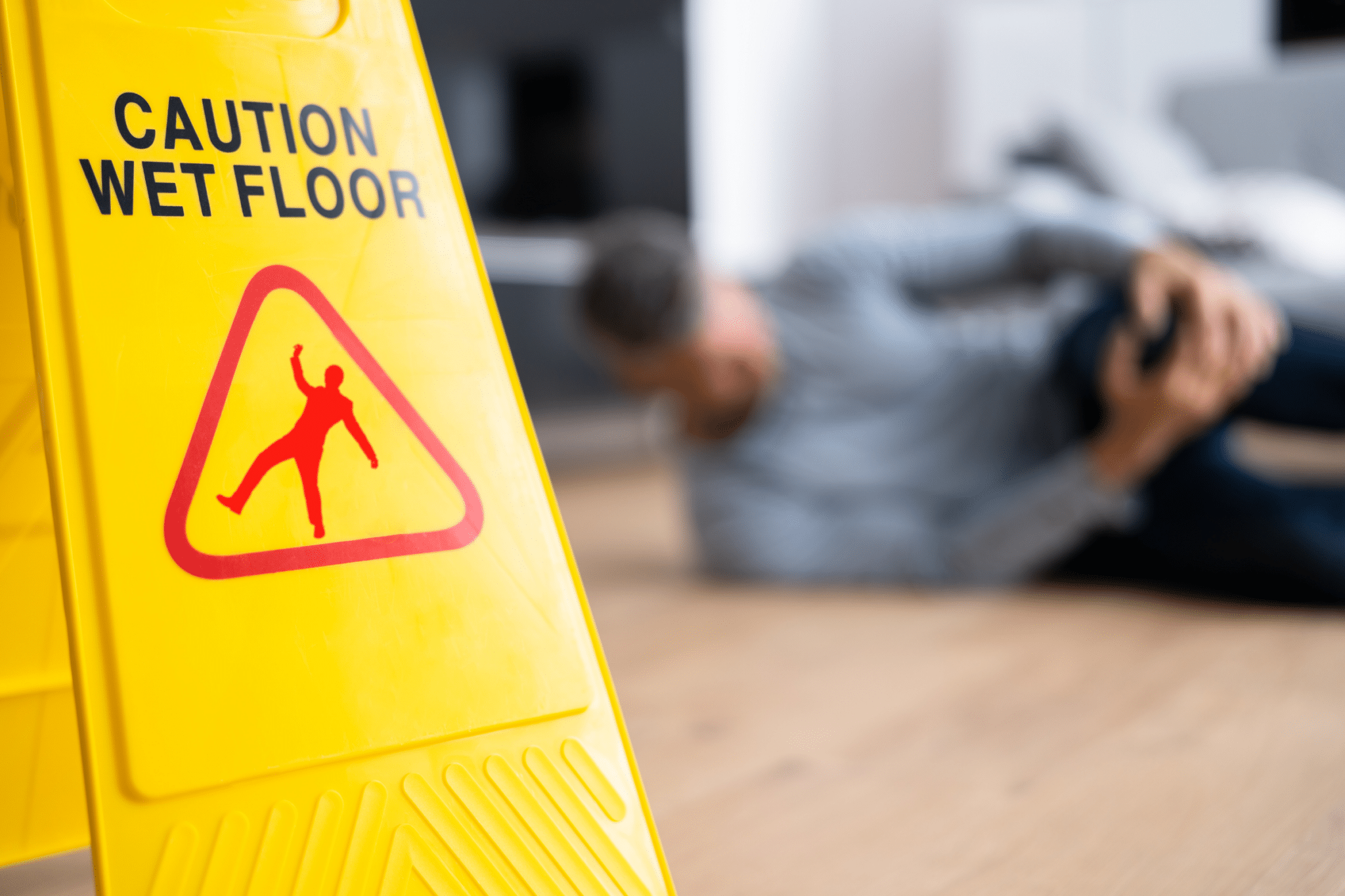
What Is a Slip and Fall Accident?
A slip and fall accident is exactly what it sounds like—a person slips, trips, or falls on someone else’s property and suffers injuries as a result. These incidents fall under the legal category of premises liability in Florida, where property owners have a duty to maintain safe conditions for visitors.
Slip and fall accidents can happen virtually anywhere: grocery stores, shopping malls, restaurants, office buildings, hotels, apartment complexes, or even on public sidewalks. What makes these cases complex is determining liability—was the property owner negligent in maintaining safe conditions, or was the injured person not paying adequate attention?
Legal Classification in Florida
In Florida, slip and fall accidents are governed by specific premises liability laws that categorize visitors into three types:
- Invitees: People invited onto the property for business purposes (customers, clients, etc.). Property owners owe the highest duty of care to invitees.
- Licensees: Social guests or people who enter the property for their own purposes with the owner’s permission. Property owners must warn licensees of known dangers that aren’t obvious.
- Trespassers: People who enter without permission. Property owners generally only have a duty not to intentionally harm trespassers, though special rules apply for child trespassers under the “attractive nuisance” doctrine.
The classification matters because it determines the level of care the property owner owes you, which directly impacts your ability to recover compensation.
Common Causes of Slip and Fall Accidents in Florida
Florida’s unique climate and tourism-focused economy create specific slip and fall hazards that may not be as common in other states. Here are the most frequent causes:
Wet and Slippery Surfaces
Florida’s frequent rain showers and high humidity create perfect conditions for wet floors, especially in:
- Store entrances during rainy weather
- Hotel lobbies where guests track in water from pools
- Restaurant floors where spills may occur
- Freshly mopped floors without proper warning signs
In 2008, Florida courts established an important precedent in Pembroke Lakes Mall Ltd. v. McGruder, determining that businesses must take reasonable measures to address foreseeable hazards like rain-soaked entrances.
Uneven Walking Surfaces
Florida’s infrastructure faces unique challenges due to:
- Shifting soil conditions causing sidewalk and pavement cracks
- Root intrusion from tropical vegetation
- Settlement issues in buildings due to the state’s limestone foundation
- Beach property transitions from sand to paved surfaces
Poor Lighting
Inadequate lighting is particularly problematic in:
- Resort stairwells and outdoor pathways
- Parking garages and lots
- Apartment building common areas
- Restaurant outdoor seating areas that transition from bright to dim lighting
Weather-Related Hazards
While Florida doesn’t experience ice and snow like northern states, it has its own weather-related risks:
- Sudden rainstorms creating unexpected wet surfaces
- Debris from tropical storms and hurricanes
- Standing water in poorly drained areas
- Mold and mildew growth on walking surfaces due to humidity
Workplace Hazards
Florida’s prominent industries have specific slip and fall risks:
- Hospitality: Wet floors in hotels and restaurants
- Agriculture: Uneven ground and irrigation systems
- Construction: Debris, tools, and temporary walking surfaces
- Healthcare: Fluid spills and high traffic areas
Nursing Home Conditions
With Florida’s large retirement population, nursing home slip and fall accidents are particularly concerning:
- Insufficient staff supervision
- Lack of proper mobility assistance
- Inadequate grab bars and safety equipment
- Poor facility maintenance
Lack of Warning Signs
Florida law requires property owners to provide adequate warning of temporary hazards, yet failures commonly occur with:
- Freshly mopped floors
- Maintenance areas
- Changes in elevation
- Newly waxed surfaces
Florida Premises Liability Law: Understanding Your Rights
Florida’s premises liability laws underwent significant changes with the 2010 adoption of Florida Statute 768.0755, which specifically addresses slip and fall accidents in businesses. This statute requires injured parties to prove that the business had actual or constructive knowledge of the dangerous condition.
Proving Liability in Florida Slip and Fall Cases
To establish a successful claim, you must demonstrate:
- Duty of Care: The property owner owed you a legal duty of care based on your visitor status (invitee, licensee, or trespasser).
- Breach of Duty: The property owner failed to uphold their duty by either creating a dangerous condition, knowing about but failing to address it, or failing to discover it through reasonable care.
- Causation: The breach of duty directly caused your slip and fall accident.
- Damages: You suffered actual injuries and losses as a result.
Constructive Knowledge Under Florida Law
Proving constructive knowledge means showing the dangerous condition existed long enough that the business should have discovered it through reasonable care. This can be established by demonstrating:
- The condition existed for a sufficient length of time
- The condition occurred regularly and was therefore foreseeable
Comparative Negligence in Florida
Florida follows a pure comparative negligence system, which means your compensation may be reduced by your percentage of fault in the accident. For example, if you’re found 20% responsible for your slip and fall (perhaps by texting while walking), your compensation would be reduced by 20%.
Common defense arguments include:
- The hazard was “open and obvious”
- You were in an unauthorized area
- You were wearing inappropriate footwear
- You were distracted or not paying reasonable attention
Statute of Limitations
In Florida, you generally have two years from the date of the slip and fall accident to file a personal injury lawsuit.
Types of Compensation Available for Slip and Fall Victims
Victims of slip and fall accidents in Florida may be entitled to several types of damages:
Economic Damages
Economic damages represent the tangible financial losses resulting from your injuries:
Medical Expenses
- Emergency room care
- Hospitalization costs
- Surgical procedures
- Medication expenses
- Physical therapy and rehabilitation
- Future medical treatment for ongoing or permanent injuries
Lost Income and Earning Capacity
- Wages lost during recovery
- Reduced earning capacity if injuries limit your ability to work
- Lost business opportunities
- Lost benefits and pension contributions
Property Damage
- Damaged personal items like phones, watches, or eyeglasses
- Torn or soiled clothing
- Damaged mobility devices
Non-Economic Damages
Non-economic damages compensate for intangible losses that don’t have a specific dollar value:
Pain and Suffering
- Physical pain endured from injuries
- Long-term discomfort and limitations
- Emotional distress and mental anguish
Loss of Enjoyment of Life
- Inability to participate in hobbies and recreational activities
- Diminished quality of life
- Loss of companionship or consortium with family members
Permanent Disability or Disfigurement
- Long-term or permanent impairments
- Scarring or disfigurement
- Mental and emotional impact of permanent changes
Punitive Damages
In rare cases involving gross negligence or intentional misconduct, Florida courts may award punitive damages. These are intended to punish particularly egregious behavior by property owners and deter similar conduct in the future.
Florida law caps punitive damages at three times the amount of compensatory damages or $500,000, whichever is greater, with certain exceptions.
The Critical Role of a Personal Injury Lawyer in Slip and Fall Cases
Navigating a slip and fall claim in Florida without legal representation can significantly reduce your chances of receiving fair compensation. Here’s how an experienced personal injury attorney can help:
Initial Case Evaluation
A skilled personal injury lawyer will:
- Provide a free consultation to evaluate the merits of your case
- Determine if you have a viable claim worth pursuing
- Explain Florida’s premises liability laws in relation to your specific situation
- Outline potential compensation and legal strategies
- Answer your questions about the legal process ahead
Thorough Investigation
Your attorney will conduct a comprehensive investigation to build your case:
- Visit and document the accident scene
- Gather and preserve evidence before it disappears
- Identify and interview witnesses
- Obtain surveillance footage if available
- Review incident reports and maintenance records
- Consult with experts to determine how the accident occurred
Documentation of Damages
Your lawyer will help document all your damages:
- Collect and organize medical records and bills
- Calculate current and future medical expenses
- Document lost wages and diminished earning capacity
- Work with medical experts to establish long-term care needs
- Build evidence of pain and suffering and quality of life impacts
Skilled Negotiation with Insurance Companies
Insurance companies often attempt to minimize slip and fall claims. Your attorney will:
- Handle all communications with insurance adjusters
- Present a compelling demand package with supporting evidence
- Counter lowball settlement offers with factual evidence
- Negotiate from a position of strength with trial preparation readiness
- Protect you from providing statements that could harm your case
Litigation Expertise
If a fair settlement can’t be reached, your lawyer will:
- File a lawsuit within Florida’s statute of limitations
- Navigate complex court procedures and requirements
- Represent you during depositions and hearings
- Prepare and present a compelling case at trial
- Work with expert witnesses to strengthen your position
Maximizing Compensation
An experienced slip and fall attorney will:
- Identify all potential sources of compensation
- Calculate the full value of your claim, including future damages
- Present evidence that counters comparative negligence arguments
- Structure settlements to protect your eligibility for benefits
- Ensure all deadlines and legal requirements are met
Contingency Fee Representation
Most reputable Florida slip and fall attorneys work on a contingency fee basis, meaning:
- No upfront costs to you
- Attorney fees paid only if you win your case
- Alignment of your interests with your attorney’s
- Access to quality legal representation regardless of financial situation
Steps to Take After a Slip and Fall Accident in Florida
The actions you take immediately following a slip and fall accident can significantly impact your ability to recover compensation:
1. Seek Medical Attention
Your health is the top priority. Even if injuries seem minor, some conditions like concussions or internal injuries may not show immediate symptoms.
- Get emergency treatment if needed
- Visit your doctor or an urgent care center as soon as possible
- Follow all treatment recommendations
- Keep all medical appointments
2. Report the Accident
Formally report the incident to the property owner, manager, or supervisor:
- Ask for a written incident report
- Request a copy of the report for your records
- Get the name and contact information of the person who took your report
- Note the date and time you made the report
3. Document the Scene
Collect evidence before it disappears:
- Take photos of the hazardous condition that caused your fall
- Capture the surrounding area to show lack of warning signs
- Document your injuries with photographs
- Note weather conditions if relevant
- Measure the height of uneven surfaces if applicable
4. Gather Witness Information
Witness testimony can be crucial to your case:
- Collect names and contact information of anyone who saw your fall
- Ask if they noticed the hazard before your accident
- Find out if they’re aware of similar incidents in the past
- See if they heard any statements from employees about the condition
5. Preserve Evidence
Keep items that may serve as evidence:
- Save the shoes and clothing you were wearing
- Don’t wash clothing that shows stains from the hazardous substance
- Keep any objects that contributed to your fall
- Save receipts for all expenses related to your injury
6. Watch What You Say
Be careful about your communications:
- Don’t give recorded statements to insurance companies
- Avoid posting about your accident on social media
- Don’t assign or accept blame at the scene
- Decline to sign any documents without legal review
7. Keep a Recovery Journal
Document your experience:
- Record pain levels and symptoms daily
- Note how injuries affect your daily activities
- Document missed work, events, and opportunities
- Keep track of emotional and psychological impacts
8. Contact a Florida Slip and Fall Attorney
Consult with an experienced personal injury lawyer:
- Bring all documentation to your initial consultation
- Discuss the incident in detail
- Review your legal options
- Determine the best path forward for your specific situation
Common Slip and Fall Injuries
Slip and fall accidents can cause a wide range of injuries, from minor to catastrophic:
Fractures and Broken Bones
Slip and falls commonly cause fractures, particularly:
- Wrist fractures from trying to break a fall
- Hip fractures, especially in older adults
- Ankle and foot fractures
- Arm and shoulder fractures
- Rib fractures from landing on hard surfaces
According to the CDC, falls are the most common cause of traumatic brain injuries and account for over 95% of hip fractures in older adults.
Head and Brain Injuries
Falls can cause serious head trauma:
- Concussions
- Traumatic brain injuries (TBIs)
- Skull fractures
- Subdural hematomas
- Post-concussion syndrome
Spinal Cord and Back Injuries
Back injuries from falls include:
- Herniated or slipped discs
- Spinal cord damage
- Compression fractures
- Sprains and strains
- Paralysis in severe cases
Soft Tissue Injuries
These injuries might not be immediately visible but can cause significant pain:
- Sprains and torn ligaments
- Muscle strains
- Tendon damage
- Nerve damage
- Contusions and bruising
Knee Injuries
The complex structure of the knee is vulnerable in falls:
- Torn meniscus
- ACL, MCL, or PCL tears
- Patellar injuries
- Dislocations
- Fractures of the patella or tibia plateau
Shoulder Injuries
Shoulder injuries often occur when trying to break a fall:
- Rotator cuff tears
- Dislocations
- Labral tears
- Shoulder impingement
- Brachial plexus injuries
Psychological Injuries
The emotional impact of serious falls can include:
- Post-traumatic stress disorder (PTSD)
- Fear of falling again (basophobia)
- Anxiety and depression
- Loss of confidence and independence
- Social isolation due to mobility limitations
Slip and Fall Accident Statistics in Florida
Understanding the scope of slip and fall accidents helps illustrate why these cases deserve serious attention:
- According to the Florida Department of Health, falls are the leading cause of injury-related deaths among Florida residents aged 65 and older.
- Falls account for approximately 2.8 million emergency department visits annually in Florida.
- The Florida Agency for Health Care Administration reports that fall-related hospitalizations cost Floridians over $3.6 billion annually.
- Nearly 60% of nursing home residents in Florida fall each year, with many falls resulting from preventable hazards.
- In Florida’s hospitality industry, slip and falls account for approximately 20% of all worker’s compensation claims.
- The construction industry in Florida reports that falls account for nearly 35% of all work-related fatalities.
- Medical costs for fall injuries among Florida seniors average $35,000 per hospitalization.
- Florida ranks among the top five states for slip and fall incidents, largely due to its large elderly population and tourism industry.
Frequently Asked Questions About Slip and Fall Accidents
How long do I have to file a slip and fall lawsuit in Florida?
In most cases, Florida’s statute of limitations gives you four years from the date of your slip and fall accident to file a personal injury lawsuit. However, this deadline can be shorter in certain circumstances:
-If you’re filing against a government entity, you typically have just three years
-If the slip and fall resulted in a wrongful death, the deadline is only two years
-For minor children, the statute may be tolled (extended) until they reach 18
Missing these deadlines almost always means losing your right to compensation, so consulting with an attorney promptly is essential.
What if I was partially at fault for my slip and fall accident?
Florida follows a “pure comparative negligence” rule, which means your compensation will be reduced by your percentage of fault, but you can still recover damages even if you were mostly at fault. For example, if your total damages are $100,000 but you’re found 40% responsible for the accident, you could still recover $60,000.
Common situations where comparative negligence might apply include:
-Being distracted (like texting while walking)
-Ignoring warning signs
-Wearing inappropriate footwear
-Being in an unauthorized area
-Running or moving carelessly in an area where caution would be expected
How much is my slip and fall case worth?
The value of a slip and fall case depends on numerous factors:
-Severity and permanence of your injuries
-Total medical expenses (past and future)
-Lost income and impact on earning capacity
-Pain and suffering damages
-Need for ongoing care or assistance
-Your age and pre-accident health status
-Clear evidence of property owner negligence
-Your percentage of comparative fault
While minor slip and fall injuries might settle for $10,000-$50,000, serious injuries involving surgery, long-term disability, or significant life impacts can be worth hundreds of thousands or even millions of dollars.
What if I slipped and fell at work?
Work-related slip and falls typically fall under Florida’s workers’ compensation system, which provides benefits regardless of fault but generally prohibits suing your employer. However, there are important exceptions:
-If a third party (not your employer) was responsible, you may have a personal injury claim against them
-If your employer doesn’t carry required workers’ compensation insurance
-If intentional misconduct by your employer caused your injury
A skilled attorney can evaluate your work-related fall to identify all potential sources of compensation.
Do I need a lawyer for a minor slip and fall injury?
Even seemingly minor injuries can develop into serious conditions later. Additionally, insurance companies often make quick, lowball settlement offers hoping you’ll accept before understanding the full extent of your injuries. A lawyer can:
-Ensure you’re properly diagnosed and treated
-Identify potential complications or long-term impacts
-Properly value your claim based on similar cases
-Handle insurance communications so you don’t inadvertently damage your claim
-Ensure all deadlines are met while you focus on recovery
Many personal injury attorneys offer free consultations, so there’s no downside to getting legal advice about your options.
What if I fell on government property?
Claims against government entities in Florida follow special rules:
-Shorter notice requirements and statute of limitations (3 years instead of 4)
-Mandatory pre-suit notification periods
-Caps on damages (currently $200,000 per person/$300,000 per incident)
-Additional immunity protections
Navigating these requirements requires specialized knowledge, making legal representation particularly important for government property claims.
How long does a slip and fall case take to resolve?
The timeline for resolving a slip and fall case varies widely:
-Simple cases with clear liability and minor injuries might settle in 3-6 months
-Cases requiring litigation often take 1-2 years
-Complex cases involving severe injuries or disputed liability can take 2+ years
-Cases that go to trial and subsequent appeals can take even longer
Your attorney can provide a more specific timeline based on the particulars of your case.
Cornish Hernandez Gonzalez, PLLC- We’re Here to Help
If you or someone you love has suffered an accident in Florida, call us immediately at (305) 745-7035. Our experienced team of slip and fall accident attorneys is available 24/7 to provide the guidance and representation you need during this difficult time.
Don’t let an accident ruin your life or leave you with lasting financial consequences. Our firm specializes in helping visitors navigate Florida’s complex legal system, and we understand the unique challenges faced by out-of-state accident victims. From dealing with insurance companies to securing proper medical care, we’ll handle every aspect of your case so you can focus on recovery.
Call (305) 745-7035 now for a free, no-obligation consultation.




